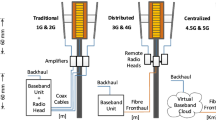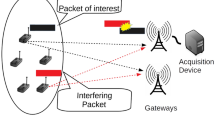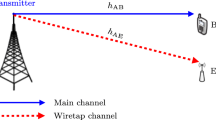Abstract
In this paper, we study the capacity of a multihop relay network with decode-and-forward strategy at each of the relay nodes. We consider both transmission power and processing power consumption at each link and a total network power constraint. We characterize the optimal number of hops that achieves maximum end-to-end throughput. In one special case, we derive an analytical expression for this optimal number of hops and show that it depends inversely on the computational power at each link. Both full-duplex (FD) and half-duplex (HD) operation of the nodes are considered and we also characterize situations in which HD operation provides higher throughput than FD operation. The effect of interference cancellation at the relay nodes is considered and the improvement in throughput is quantified.







Similar content being viewed by others
References
Avestimehr, A., Diggavi, S., Tse, D.: Wireless network information flow: a deterministic approach. IEEE Trans. Inform. Theory 57(4), 1872–1905 (2011). doi:10.1109/TIT.2011.2110110
Chiang, M., Hande, P., Lan, T., Tan, C.W.: Power control in wireless cellular networks. Found. Trends Netw. 2, 381–533 (2008)
Cover, T., Gamal, A.: Capacity theorems for the relay channel. IEEE Trans. Inform. Theory 25(5), 572–584 (1979). doi:10.1109/TIT.1979.1056084
Cover, T.M., Thomas, J.A.: Elements of Information Theory, 2nd edn. Wiley, New York (2006)
Dhaka, K., Mallik, R., Schober, R.: Performance analysis of decode-and-forward multi-hop communication: a difference equation approach. IEEE Trans. Commun. 60(2), 339–345 (2012). doi:10.1109/TCOMM.2012.12.100705
Farhadi G., Beaulieu N. (2009) Power-optimized amplify-and-forward multi-hop relaying systems. IEEE Trans. Wirel. Commun. 8(9):4634–4643 doi:10.1109/TWC.2009.080987
Farhadi, G., Cioffi, J.: Spectral efficient multihop relaying based on alternate transmission. IEEE Trans. Wirel. Commun. 10(11), 3601–3606 (2011). doi:10.1109/TWC.2011.092011.102059
Gomez-Vilardebo, J., Perez-Neira, A.: Bounds on maximum rate-per-energy for orthogonal AWGN multiple-relay channels. IEEE Trans. Wirel. Commun. 7(11), 4238–4247 (2008). doi:10.1109/T-WC.2008.070486
Host-Madsen, A., Zhang, J.: Capacity bounds and power allocation for wireless relay channels. IEEE Trans. Inform. Theory 51(6), 2020–2040 (2005). doi:10.1109/TIT.2005.847703
Ikki, S., Aissa, S.: Multihop wireless relaying systems in the presence of cochannel interferences: Performance analysis and design optimization. IEEE Trans. Veh. Technol. 61(2), 566–573 (2012). doi:10.1109/TVT.2011.2179818
Khojastepour, M., Sabharwal, A., Aazhang, B.: On the capacity of ‘cheap’ relay networks. In: Proceedings of 37th CISS. The Johns Hopkins University, Baltimore (2003)
Kramer, G., Gastpar, M., Gupta, P.: Cooperative strategies and capacity theorems for relay networks. IEEE Trans. Inform. Theory 51(9), 3037–3063 (2005). doi:10.1109/TIT.2005.853304
Laneman, J., Tse, D., Wornell, G.: Cooperative diversity in wireless networks: efficient protocols and outage behavior. IEEE Trans. Inform. Theory 50(12), 3062–3080 (2004). doi:10.1109/TIT.2004.838089
Meulen, V.D.: Three terminal communication channels. Adv. Appl. Probab. 3, 120–154 (1971)
Ngo, H.Q., Larsson, E.: Linear multihop amplify-and-forward relay channels: error exponent and optimal number of hops. IEEE Trans. Wirel. Commun. 10(11), 3834–3842 (2011). doi:10.1109/TWC.2011.092011.102194
Ong, L., Motani, M.: Optimal routing for decode-forward in cooperative wireless networks. IEEE Trans. Commun. 58(8), 2345–2355 (2010). doi:10.1109/TCOMM.2010.08.090134
Reznik, A., Kulkarni, S., Verdu, S.: Degraded Gaussian multirelay channel: capacity and optimal power allocation. IEEE Trans. Inform. Theory 50(12), 3037–3046 (2004). doi:10.1109/TIT.2004.838373
Sagias, N., Lazarakis, F., Tombras, G., Datsikas, C.: Outage analysis of decode-and-forward relaying over Nakagami fading channels. IEEE Signal Process. Lett. 15, 41–44 (2008). doi:10.1109/LSP.2007.910317
Shah, V., Mehta, N., Yim, R.: The relay selection and transmission trade-off in cooperative communication systems. IEEE Trans. Wirel. Commun. 9(8), 2505–2515 (2010). doi:10.1109/TWC.2010.070710.090487
Shannon, C.E.: A mathematical theory of communication. Bell Syst. Tech. J. 27, 379–423 (1948)
Sikora, M., Laneman, J., Haenggi, M., Costello, D., Fuja, T.: Bandwidth- and power-efficient routing in linear wireless networks. IEEE Trans. Inform. Theory 52(6), 2624–2633 (2006). doi:10.1109/TIT.2006.874520
Vaze, R., Heath, R.: To code in space and time or not in multihop relay channels. IEEE Trans. Signal Process. 57(7), 2736–2747 (2009). doi:10.1109/TSP.2009.2017002
Xie, L.L., Kumar, P.R.: An achievable rate for the multiple-level relay channel. IEEE Trans. Inform. Theory 51(4), 1348–1358 (2005)
Zhang, W., Stojanovic, M., Mitra, U.: Analysis of a linear multihop underwater acoustic network. IEEE J. Ocean. Eng. 35(4), 961–970 (2010). doi:10.1109/JOE.2010.2055271
Author information
Authors and Affiliations
Corresponding author
Rights and permissions
About this article
Cite this article
Rajan, D. Optimum number of hops in linear multihop wireless networks. Int J Adv Eng Sci Appl Math 5, 32–42 (2013). https://doi.org/10.1007/s12572-013-0080-8
Published:
Issue Date:
DOI: https://doi.org/10.1007/s12572-013-0080-8




